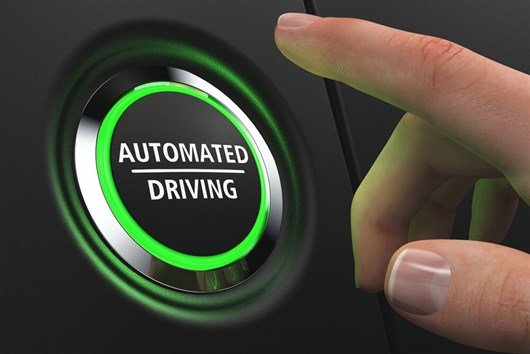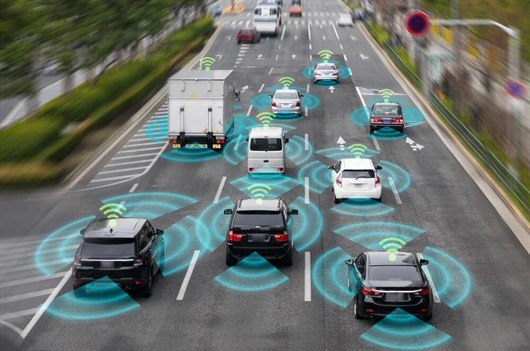Self-driving cars could be on UK motorways in 2023

- Cars with self-driving features could be used on motorways from 2023.
- Manufacturers will be responsible for the vehicle’s actions when self-driving, under new legislation.
- Government is making a £100 million investment, including researching safety and commercial aspects.
The Government has unveiled a new plan for the roll out of self-driving vehicles by 2025, backed by a £100 million investment of public money.
Some vehicles, including cars, coaches and lorries, with self-driving features could be operating on motorways in the next year, the Government said, with new legislation allowing for the safe wider roll out of self-driving vehicles by 2025.
To support this it has confirmed £34 million today (19 August 2022), as part of the overall £100 million, for research on safety developments and to inform more detailed legislation, £20 million to help kick-start commercial self-driving services and £6 million for further market research and to support commercialisation of the technology.
Vehicles that can drive themselves on motorways could be available to purchase within the next year, although users would still require a valid driving licence so they can drive on other roads. Other self-driving vehicles, for example used for public transport or delivery (which are expected on the roads by 2025) would not need anyone onboard with a driving licence because they would be able to drive themselves for the whole journey, the Government said.

Manufacturers responsible for actions of self-driving vehicles
Ahead of the new legislation, the Government has launched a consultation on a ‘safety ambition’ for self-driving vehicles to be "as safe as a competent and careful human driver".
The new legislation will state that manufacturers are responsible for the vehicle’s actions when self-driving and they will also need to ensure that vehicles meet certain standards to be allowed to 'self-drive' on the roads. If these standards aren't met manufacturers could face sanctions.
Transport secretary Grant Shapps said: “The benefits of self-driving vehicles have the potential to be huge. Not only can they improve people’s access to education and other vital services, but the industry itself can create tens of thousands of job opportunities throughout the country.
"Most importantly, they’re expected to make our roads safer by reducing the dangers of driver error in road collisions.

'Big leap' from assisted driving systems to self-driving
Shapps continued: "We want the UK to be at the forefront of developing and using this fantastic technology, and that is why we are investing millions in vital research into safety and setting the legislation to ensure we gain the full benefits that this technology promises.”
AA president Edmund King said that although assisted driving systems, for example, autonomous emergency braking and adaptive cruise control, "are already helping millions of drivers stay safe on the road" it is "still quite a big leap to self-driving, where the car takes control".
"It is important that the Government does study how these vehicles would interact with other road users on different roads and changing weather conditions," he said. "However, the ultimate prize, in terms of saving thousands of lives and improving the mobility of the elderly and the less mobile, is well worth pursuing."
"It would require a real culture change." RAC head of roads policy Nicholas Lyes
RAC head of roads policy Nicholas Lyes also acknowledged the potential of self-driving vehicles but warned that RAC research also shows drivers like to be in control of their vehicle so "it would require a real culture change for the public to fully embrace driverless technology”.

Collaboration is needed for safe adoption
Jonathan Hewett, chief executive of Thatcham Research added: “The cars we drive are changing at an unprecedented rate. But the automotive industry is still at the lower end of a steep learning curve. It’s vital that we balance the risk with the opportunity, gathering intelligence on the different use cases for the technology and in turn understanding what it means for all road users.
“All the ingredients are present for the UK to become a global leader in this space. However, it is paramount that we make sense of the data these vehicles will provide, to inform risk and ultimately pave the way for safe adoption.
“Any challenges encountered by vehicles with self-driving capability will be heavily scrutinised. Complete clarity around the driver’s legal responsibilities, along with how the technology is marketed, how the dealer describes systems when handing over the keys and how the self-driving system itself communicates with the driver, will play its part too.
“As such, collaboration between Government, regulators, carmakers and the insurance industry will be essential to creating a safe system for adoption and the age of humankind interacting with autonomous technology.”
The new laws for the safe roll out of self-driving vehicles by 2025 will be brought forward when parliamentary time allows.
Do I need a driving licence to drive a self-driving car?
Yes, the Government has confirmed that if you purchase a car in 2023 which is capable of self-driving on motorways you would still need a valid driving licence in order to drive on other roads.
However, other self-driving vehicles, for example used for public transport or delivery (which are expected on the roads by 2025) would not need anyone onboard with a driving licence because they would be able to drive themselves for the whole journey, the Government said.
Who is responsible if a self-driving car crashes?
The new UK legislation will state that manufacturers are responsible for the vehicle’s actions when self-driving and they will also need to ensure that vehicles meet certain standards to be allowed to 'self-drive' on the roads. If these standards aren't met manufacturers could face sanctions.
How safe are self-driving cars?
Human error is involved in 80 per cent of all road collisions that result in personal injury, self-driving vehicles could deliver "substantial" safety improvements, the UK Government said.
However, there have been a number of fatalities in other countries that have involved drivers using cars in self-driving mode.
If automated braking in my car caused an accident, could I hold the manufacturer liable?

What is the safest small car?


